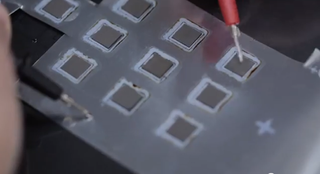Flexible, ultra-thin batteries in works for wearable tech
Californian startup edges closer to bringing printable zinc battery to market

Imprint Energy has secured $6 million in funding as the firm takes a significant step in bringing its flexible, paper-thin battery technology to market.
The technology will help device manufacturers make thinner, more flexible wearable devices as they will no longer be limited by bulky Li-Ion battery packs.
Instead of making incremental improvements to existing battery technology, scientists at Imprint Energy developed a printable Zinc battery capable of recharging.
Dubbed ZincPoly, the solid-state technology can be printed in a range of sizes and shapes, and is wafer-thin and flexible. Crucially, the high density cells are capable of outperforming conventional batteries and have a lifetime comparable to Li-On counterparts.
Other advantages of Zinc include its non-toxic nature and low development costs, as the material is abundant. It's also robust, with batteries able to continue functioning when they are compressed or even punctured.
There is no time frame for when the technology will make it to market, but Imprint Energy has confirmed the funds will be used to accelerate development and secure design wins in the wearable tech and Internet of Things markets.
Get the ITPro. daily newsletter
Receive our latest news, industry updates, featured resources and more. Sign up today to receive our FREE report on AI cyber crime & security - newly updated for 2024.




